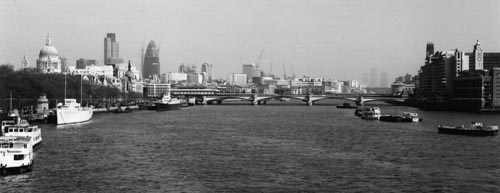Analysis: The Thames - transport for London
WORKERS, MAY 2010 ISSUE
PROPOSALS FOR the improvement of London’s river-borne transport and its integration into the whole transport system have been around for many years. Now Boris Johnson, Mayor of London, has dusted off and repackaged them as Boris’s big idea. He suggests putting in place at a relatively small sum – £30 million – to convert the Thames into a water-borne tube line. Sounds good, but look at the small print.
Ideas that bear the hallmarks of traditional nationalised industry are being applied by Tory think tanks to changing the river usage. For example, modern air traffic control management for passenger transport on the river; integrated tickets with rail, tube and bus transport; centralised control of piers and access; subsidies for fares and transport companies; control concentrated in one authority – Transport for London (The Mayor); scrapping any organisation not politically controlled by the Mayor – i.e. the Port of London Authority – in the name of modernisation; using public money to pump prime the exploitation of the river, whose decline for the past 60 or more years has paralleled that of British capitalism. Is it to utilise a huge natural asset for the benefit of Londoners, or to make vast profits for the companies concerned?

|
With road traffic in London now slower than in Victorian times, the barren and almost empty Thames is seen as a way of improving travel and generating income. The proposed centralisation, integration and modernising of facilities, which everyone would welcome, aims to boost river passengers from 3 million in 2009 to 12 million by 2026.
A Thames Concordat of all interested parties was established in 2009 to examine ways of greater exploiting the river and passengers. Changes to the National Boatmaster’s Licence have allowed skill levels and knowledge of river conditions to be reduced. This has undermined traditional localised employment and allowed worsened terms and conditions to be introduced for staff employed on the proposed passenger services – as happened on cross-Channel ferries when the Channel Tunnel was built.
The Port of London Authority, which oversees environmental and safety matters on the Thames, would be an early victim, as its historic reason for existence, London’s docks, have been replaced by the finance hub of Canary Wharf and associated tower blocks. But safety should be paramount as passenger numbers are driven up and congestion grows on a tidal river with a near 30 foot rise to high from low. Crews without local knowledge of the river, minimal safety regulation and large numbers of vessels could easily combine to cause accidents.
An integrated transport service, innovation in using the river, high tech solutions and safety coupled with local expertise have to be supported against what is the real driving force behind these proposals: greed and personal ego. Yes to the river, no to the profiteers.